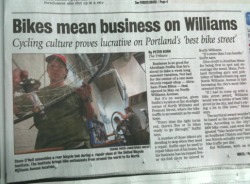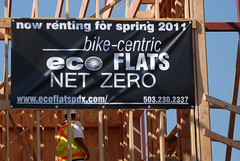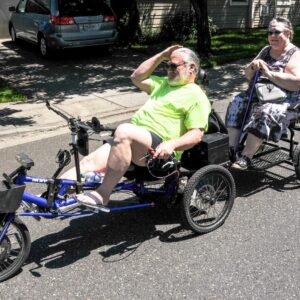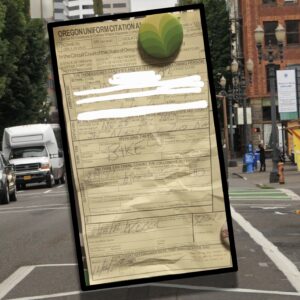
Few anti-bike ideas are as stubborn as the age-old cries of “Bikes are bad for business!” In Portland, when our bikeway network was gaining steam in the 1990s, PBOT faced battle after battle when they tried to stripe bike lanes on streets adjacent to businesses. As recently as this past May, KATU-TV (our local ABC affiliate) promoted the fallacy with their infamous “Bike path to nowhere” story which was a fitting follow-up to their “Businesses fear city bike plan might drive people away” piece which aired after the 2030 Bike Plan passed last October.
But times are changing, at least in Portland.
This morning, the Portland Business Journal hosted a “Power Breakfast” with Bike Gallery owner, Oregon State Parks commissioner, and national bicycle industry and advocacy powerhouse Jay Graves. Graves has become something of a de facto spokesperson for the business benefits of bicycling in recent years. He sits on the Transportation Committee of the Portland Business Alliance and they even honored him with an award at their annual meeting back in April for his work on the 2030 Bike Plan.
Also this morning, the Portland Tribune has a story on their front page titled, “Bikes mean business on Williams: Cycling culture proves lucrative on Portland’s ‘best bike street’“. The story details the “bicycle-oriented development” (a play on the more well-known term, transit-oriented development) that I first pointed out back in January. Here’s a snip from the Tribune piece:
“…the business community along Williams has embraced the biking theme like no other business district in town… The street has three street-side bike corrals that have replaced parking spots, and local restaurants have signs encouraging bike commuters to take advantage of their happy hours.”
This coming October when the national Rail-Volution conference comes to Portland, the drumbeat of bikes being good for business will get even louder. One of the panel discussions on the schedule is titled, Biketopia: Is Bicycle Oriented Development (BOD) the new TOD [Transit Oriented Development]?. I’ll sit on that panel with Portland real estate developer Jon Kellogg (the man responsible for much of the bike-centric tenants on N. Williams). We’ll share with the transit folks how a bike-friendly street can spur business just as effectively (if not more so) than light rail and streetcars.
While these signs are positive, Portland is sure to face future anti-bike, pro-business arguments again. But my hunch is that those arguments will be fewer and farther between and eventually, as the N Williams phenomenon gets more attention and more copycats, those anti-bike arguments — like the one made on Seattle’s Crosscut blog yesterday — will fade away.








Thanks for reading.
BikePortland has served this community with independent community journalism since 2005. We rely on subscriptions from readers like you to survive. Your financial support is vital in keeping this valuable resource alive and well.
Please subscribe today to strengthen and expand our work.
I do not consider “pro-bike” to be anti-business. However, I do strongly believe that the “anti-car” agenda is extremely damaging. One need not be anti-car to be pro-bike.
This would seem to refrudiate the notions of some down town Vancouver business owners.
Was just talking to a Portland rider last weekend about bikes in the City, how open transport could bring way more ppl into the
shops. since auto traffic will soon be at a halt one day. future methods better.
power to the ppl
Pro-bike or not, I think that an “anti-car” mindset is a good thing–call it being unfashionably long-term in one’s thinking.
Jonathan,
Glad to see the Tribune article. There is definitely growing interest in linking land use and to bicycling nationwide. Taking cues from the TOD planning is a certainly a winning strategy. I look forward to the discussion at Railvolution. For anyone interested, my firm Crandall Arambula has been developing plans and implementation strategies that incorporate BCD principles with numerous cities in the US and Canada.For more info see link: http://www.ca-city.com/images/news/pdfs/Bicycle%20Centered%20Development.pdf
Time for someone to do a before and after study of residential property values on a bike boulevard. I would guess prices on Ankeny, Lincoln, et al have got to be higher than pre-bike or compared with nearby comparable streets.
Perhaps we should come up with a better expression than “anti-car”, because what (I think) most of us here support is more “anti-car-as-dominant-mode-at-the-expense-of-all-else”, but that’s hard to say.
Cars will never go away; they will run on something other than oil:
http://www.nytimes.com/2010/08/19/business/energy-environment/19fuel.html?ref=energy-environment&pagewanted=all
I wonder if there are any hard numbers that either supports or refutes that bikes are good or bad for business?
#6 benschon:
What is the time frame on that?
Portlandmaps.org has that data within certain bounds.
I’m a capitalist. I use my free will to choose local sustainable businesses that support other local sustainable businesses. Williams makes it easier. I particularly like spending my “gas money” at 5th Quadrant 🙂
I never quite understand but it seems supporting small business in this way conflicts with conservative pro-business ideas.
joeb,
Remember, “pro-business” is like “pro-family.” It means whatever they WANT it to mean. See also “states’ rights” and “activist judge.”
@ Greg #1
“I do not consider “pro-bike” to be anti-business. However, I do strongly believe that the “anti-car” agenda is extremely damaging. One need not be anti-car to be pro-bike.”
Agreed, it’s all about moderation and inclusion, not exclusion. Cars will always be around, but the lack of acceptance by the cycling community just reeks the same bigotry and ignorance that the anti-bike crowd throws at us cyclists.
Take the higher road, people…
Merckxrider: being anti-car alienates people who drive cars, you know, the very people that you would want to stop driving and start riding bikes. It also alienates cyclists who happen to own a car.
So would the gentrification of the area also be part of the reason for the emergence of businesses on Williams?
“Graves has become something of a de facto spokesperson for the business benefits of bicycling in recent years.”
— I bet this has nothing to do with his bike shops.
GLV (#8) – They might, they might not. Oil production is peaking now. We need at least a decade, maybe more to convert the existing infrastructure that delivers gasoline to the existing motor fleet over to whatever will replace it. Alternative cars will likely cost more, their fuel will likely cost more per equivalent mileage compared to gas, and with oil production poised to drop at roughly 5-8% per year, it’s likely available fuel will drop faster than demand, raising prices for those who are still on gasoline.
There’s a very good chance that motorized travel will increasingly become an option for the rich. And many of those who will no longer be able to afford a car will be unable to take public transit, because transit agencies are cutting service to save costs, even as transit ridership is on the increase.
jbiker (#13) – “Take the higher road” – I’m not so sure anymore that I want to. Cars kill 40,000-45,000 people each year directly, through blunt force trauma, and who knows how many each year through emissions, pollution from the manufacturing process, and victims of wars which support our ability to feed our 5% of the world’s population with 20-25% of the world’s oil. (78% of which is used for transportation)
Being inclusive isn’t going to change people’s consumption habits any more than it would have stopped drunk driving. Drunk driving was only stopped because a large enough group of people made it socially unacceptable to drive drunk. (enforcement was a large part of that, but neither would have worked alone) We all need to consume less, and encourage others to do the same (or actively discourage them from consuming more).
Cars are killing people. Consumption is killing people. Both are killing the planet, and the system is biased towards maintaining the status quo. At some point, people have to say enough is enough. We can be nice to each other until we all die from the consequences of actions we refused to protest out of fear of alienating others, or we can start getting a little bit in people’s faces and telling them to stop screwing things up. Are they going to get mad? You betcha. But do we really want to keep letting people die and letting our urban environments remain impersonal, dirty and noisy just because we don’t want to offend someone?
Forget that – I’ll risk offending them.
SkidMark (#14) – Cool, let’s offend some folk – see my above response to jbiker.
Skidmark, to some people, life itself is alienating and offensive.
@ matt #17
Your intolerance is exactly the bigotry I’m talking about. Bigotry is the same if it’s based on skin color, or judging other peoples lifestyle based on cars, or not.
It’s OK that are different opinions and views. Relax, and accept people for who they are.
jbiker (#19) – Generally race, nationality, gender, age, sexual preference and other factors of birth do not directly cause the death of 40,000 people per year.
I am relaxed, and I do accept people for who they are. Usually I am arguing for appropriate mode for the appropriate trip (i.e. walk or bike for <1 mile) – and I have rarely if ever argued for banning any mode of travel outright. I still believe that cars should be permitted on the roads, and people should have a choice – but the choice to have a few hundred million automobiles on the road is causing far more issues than it solves, and to ignore that fact and its repercussions is irresponsible to say the least.
It's not bigotry, but it's apparent that you don't see it that way.
Picio:
“I am relaxed, and I do accept people for who they are”
You contradicted yourself: yet you also call people “irresponsible”.
Yeah, that’s not judgmental at the least. BTW, I read your rants as bigoted, too. And bigotry IS the same as skin color or lifestyle. I would suggest you look it up in the dictionary.
I’ve found new places to eat/shop as a direct result of riding my bike through town. It’s much easier to see what businesses are along a street that you don’t normally walk down when on a bike. Put a place to lock up, and I’ll stop while on the ride.
Matt #20-
It sounds like bigotry to me!
big·ot·ry / pronunciation [big-uh-tree]
1. stubborn and complete intolerance of any creed, belief, or opinion that differs from one’s own.
*Reference source; Dictionary.com
Allen (#21) and Barney (#23) – My point in post #17 is that there are cases where perhaps it’s better to rile people up by stating that their preferred mode of transport has repercussions, and the common argument is that we don’t want to risk offending potential riders. My point is that if we always fear alienating people by stating our opinions, then the very real issues surrounding our chosen lifestyles will never be addressed. Before taking my comments out of context, do a search on this site for my name and look at my extensive comments over the last 4 years. I have never outright advocated banning cars. Yet I raise the issue that perhaps we should start talking about the effect cars have, and I’m accused of bigotry. Who is being intolerant of conflicting opinions here?
Also, Allen – I can accept people for who and what they are and still disagree with them. I never called anyone “irresponsible”, I said that ignoring the repercussions of one’s lifestyle is irresponsible – do you disagree with that statement? And Barney, I have not demonstrated “complete intolerance”, merely disagreement. For that matter, if you give me a logical reaason why cars are an effective and sustainable mode of transportation, I’ll probably change my opinion.
Opinionated, yes I am. Outspoken? Guilty as charged. Bigoted? I leave that as an exercise for the reader. By the way, I am frequently at local bike events and other civic functions, and I’m happy to talk face-to-face if you want to discuss the issue further. It’s far easier to have conversations in real time than over an easily-misunderstood medium like text.
My point in providing the definition of bigotry is that I believe that advocates of many causes are often bigoted. Most will excuse themselves from being labeled as such because “their” cause is so just. It seems to me that it is either a “big tent” and “can’t we all just get along”, or “it’s my way or the highway.” Your comments; “getting a little bit in people’s faces” and “Cool, let’s offend some folk” seem less than tolerant to me and more in the “my way” category.
Also, the examples used in your post #17 seem to have taken the discussion way off topic: Your personal agenda on the evil rich, drunk drivers and the murderous automobile aren’t really releavent to how bikes are good for business in Portland.
Look, I both ride and drive responsibly and I don’t want to give up the freedom that each mode brings to me. Can’t you accept that?
Barney (#25) – “Cool, let’s offend some folk” is meant partially tongue-in-cheek, but that doesn’t come through in text.
“way off topic” – the comment I responded to was that “pro-bike” shouldn’t mean “anti-car”, and that we should take the high road so as not to offend people who might otherwise ride. I disagreed. I view the other issues as related, and had there not been responses to the post, that would have been the end of it.
“I don’t want to give up the freedom” – cool, don’t do it. I’m not asking you to give it up. I totally accept that you’d like to continue driving, and I am absolutely against banning or restricting cars from using the roads. I’m merely saying that car use has repercussions, and that I’m going to continue to point out that the way the average person uses their car has very real, harmful effects.
Dissent and differences of opinion are healthy. They are not bigotry, they are not intolerance. Intolerance is when one prohibits discussion, or refuses to hear a dissenting opinion, or restricts the rights of others. Nearly everyone I know drives at least part of the time, and I owned a car for more than 20 years. I don’t tell them they can’t drive. I socialize with them, I buy them drinks, give them gifts, and I don’t think less of them because they drive a car. Some people have to drive. Some people eat meat. Some people own guns. Others don’t do any of those things, and none of those choices affect how I see them.
That said, leaving a gun lying around is dangerous. Eating meat from factory farms is cruel to animals. Driving puts pollution in the air, uses oil which is by and large imported from unstable regimes, or in ways that harm the environment (BP Gulf, Alberta Tar Sands), and killed over 450 people in Oregon last year. Should we just ignore all that? Is it really bigoted or intolerant to talk about it, and say “maybe we should examine other options”?
Frankly, I’m tired of taking the high road *all* the time, and being inclusive so as not to offend anyone else. my original comment said “I’m not so sure anymore that I want to” – that’s a far cry from even being a declarative statement.
All you readers who made it this far – apologies for the extended replies, I generally try to limit mine to no more than 2. And thanks Jonathan for being tolerant of off-topic discussion and a wide variance of opinions.